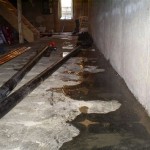Understanding R-Value for Basement Walls: A Comprehensive Guide
Ensuring your basement's thermal efficiency is crucial for maintaining a comfortable and energy-efficient living space. One key aspect to consider is the R-value of your basement walls. R-value measures the resistance of a material to heat flow, and a higher R-value indicates better insulation.
Why is R-Value Important for Basement Walls?
Basement walls are often exposed to colder temperatures, especially during winter months. Poorly insulated walls can lead to heat loss, which can increase energy bills and create cold and damp conditions in your basement. An adequate R-value for basement walls helps prevent heat loss, maintains a stable temperature, and reduces energy consumption.
Determining the Optimal R-Value
The optimal R-value for basement walls depends on several factors, including local climate conditions and building regulations. In general, a higher R-value is desirable for colder climates, while a lower R-value may be sufficient in warmer regions. Building codes often specify minimum R-values for different types of construction, which you should adhere to.
Choosing Insulation Materials
Various insulation materials can be used to achieve the desired R-value for basement walls. Common options include:
- Rigid Foam Insulation: Polystyrene and polyurethane foam panels offer high R-values per inch of thickness.
- Batt Insulation: Fiberglass or cellulose batts are commonly installed between wall studs or joists.
- Spray Foam Insulation: This expandable foam can provide a continuous, air-tight seal with excellent R-values.
- Basement Wall Insulation: Prefabricated panels specifically designed for basement walls provide high R-values and easy installation.
Installation Considerations
Proper installation is crucial to ensure the effectiveness of basement wall insulation. Make sure to:
- Install insulation tightly to prevent air gaps.
- Seal all joints and gaps with caulk or foam.
- Consider using a vapor barrier to prevent moisture from entering the insulation.
- Follow manufacturer's instructions for the specific insulation material you choose.
Benefits of Adequate R-Value
Installing insulation with an appropriate R-value for basement walls offers numerous benefits:
- Energy Savings: Reduced heat loss leads to lower energy bills.
- Improved Comfort: A well-insulated basement creates a warmer and more comfortable living space.
- Moisture Control: Insulation helps prevent condensation and moisture buildup, which can damage walls and promote mold growth.
- Structural Protection: Insulation can help protect basement walls from freeze-thaw damage.
Conclusion
Understanding the R-value for basement walls is essential for ensuring the thermal efficiency and comfort of your basement. By choosing the right insulation material and R-value, and following proper installation guidelines, you can create a basement that is warm, dry, and energy-efficient.

What R Value Do I Need Johns Manville

Know Your R Value The House Designers

Insulation Levels For Cold Hot And Moderate Climates

Etw Foundation Code Minimum R 10 Continuous Insulation Buildingscience Com

Basement Wall Insulation Achieving Best Results Rmax

Recommended Home Insulation R Values

R Values And U Factors Of Single Wythe Concrete Masonry Walls Ncma

The Importance Of Insulation R Values Eco Spray

Basement Wall Insulation Naturalgasefficiency Org

How Much Insulation Does Your Home Need Guide
Related Posts







